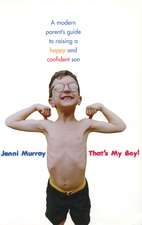Lifting the Weight: Understanding Depression in Men, Its Causes and Solutions
Autor Martin Kantor MDen Limba Engleză Hardback – 29 aug 2007 – vârsta până la 17 ani
Preț: 287.55 lei
Preț vechi: 349.64 lei
-18% Nou
Puncte Express: 431
Preț estimativ în valută:
55.03€ • 57.10$ • 45.99£
55.03€ • 57.10$ • 45.99£
Carte tipărită la comandă
Livrare economică 15-29 martie
Preluare comenzi: 021 569.72.76
Specificații
ISBN-13: 9780275993726
ISBN-10: 0275993728
Pagini: 232
Dimensiuni: 156 x 235 x 23 mm
Greutate: 0.5 kg
Editura: Bloomsbury Publishing
Colecția Praeger
Locul publicării:New York, United States
ISBN-10: 0275993728
Pagini: 232
Dimensiuni: 156 x 235 x 23 mm
Greutate: 0.5 kg
Editura: Bloomsbury Publishing
Colecția Praeger
Locul publicării:New York, United States
Notă biografică
Martin Kantor, MD is a Harvard psychiatrist who has been in full private practice in Boston and New York City, and active in residency training programs at several hospitals, including Massachusetts General and Beth Israel in New York. He also served as Assistant Clinical Professor of Psychiatry at Mount Sinai Medical School and as Clinical Assistant Professor of Psychiatry at the University of Medicine and Dentistry of New Jersey-New Jersey Medical School. He is currently a full-time medical author, the author of more than a dozen other books, including Homophobia, Second Edition (Praeger 2009); Uncle Sam's Shame: Inside the Veteran's Administration (Praeger 2008); Lifting the Weight: Understanding Depression in Men: Its Causes and Solutions (Praeger 2007); The Psychopathy of Everyday Life: How Antisocial Personality Disorder Affects All of Us (Praeger, 2006); Understanding Paranoia: A Guide for Professional, Families, and Sufferers (Praeger 2004); Distancing: Avoidant Personality Disorder, Revised and Expanded (Praeger, 2003), Passive-Aggression: A Guide for the Therapist, the Patient, and the Victim (Praeger, 2002), Treating Emotional Disorder in Gay Men (Praeger, 1999), and Homophobia (Praeger, 1998).
Recenzii
This is among the most compelling books on the topic of men and depression this reviewer has ever encountered. Kantor uses his deep professional insights and vast experience to tease apart and explain the complexities involved in the diagnosis and treatment of men suffering from depression. The book covers such topics as guilt, paranoia, sexuality, violence, and passive dependency, and many of the chapters conclude with the differences in the way these difficulties play out in men and women..Clinicians will particularly appreciate a chapter on therapeutic errors, which maps out many mistakes and misperceptions that are common in treating depressed men, e.g., urging the client to take a vacation or increase physical activity. Chapters on self-help and coping with depressed men are also excellent. Readers should profit from Kantor's expansive understanding of this complex topic. Highly recommended. Graduate students through professionals.
To his credit, Kantor avoids overly complicated writing and jargon, attempting to appeal to a broader church than professionals. Additionally, the author is obviously well attuned to the issues facing men prone to depression. His sensitivity to men and their issues is a real strength of the book. Thus, readers will find some fascinating reading here on a broad range of issues including sadomasochism and male depression, male lear of success and depression, the translation of male depression into hypomania, anger and self- or other-criticism, and dealing with male client resistances (for example, excessively blaming others or not feeling the need for help). The psychotherapy and self-help chapters are particularly useful in showing the broad tools that men can use . . . Kantor should be commended for putting out there his best understanding from the perspective of an experienced practitioner. I believe this book is an excellent place to start for those practitioners and clients who wish to learn more about depression among a surprisingly neglected group--men.
To his credit, Kantor avoids overly complicated writing and jargon, attempting to appeal to a broader church than professionals. Additionally, the author is obviously well attuned to the issues facing men prone to depression. His sensitivity to men and their issues is a real strength of the book. Thus, readers will find some fascinating reading here on a broad range of issues including sadomasochism and male depression, male lear of success and depression, the translation of male depression into hypomania, anger and self- or other-criticism, and dealing with male client resistances (for example, excessively blaming others or not feeling the need for help). The psychotherapy and self-help chapters are particularly useful in showing the broad tools that men can use . . . Kantor should be commended for putting out there his best understanding from the perspective of an experienced practitioner. I believe this book is an excellent place to start for those practitioners and clients who wish to learn more about depression among a surprisingly neglected group--men.













